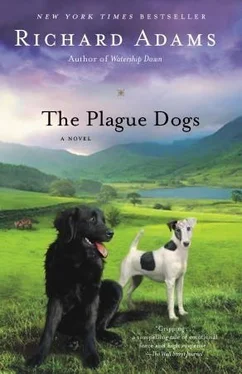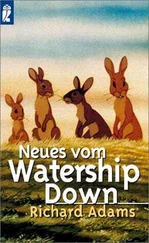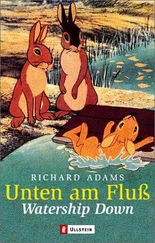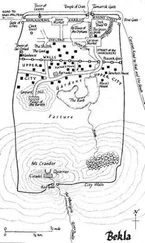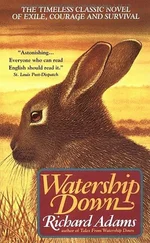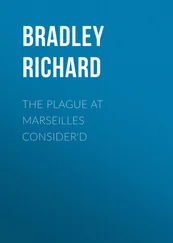Richard Adams - The Plague Dogs
Здесь есть возможность читать онлайн «Richard Adams - The Plague Dogs» весь текст электронной книги совершенно бесплатно (целиком полную версию без сокращений). В некоторых случаях можно слушать аудио, скачать через торрент в формате fb2 и присутствует краткое содержание. Город: New York, Год выпуска: 2007, ISBN: 2007, Издательство: Ballantine Books, Жанр: Природа и животные, Фэнтези, на английском языке. Описание произведения, (предисловие) а так же отзывы посетителей доступны на портале библиотеки ЛибКат.
- Название:The Plague Dogs
- Автор:
- Издательство:Ballantine Books
- Жанр:
- Год:2007
- Город:New York
- ISBN:978-0-345-49402-3
- Рейтинг книги:3 / 5. Голосов: 1
-
Избранное:Добавить в избранное
- Отзывы:
-
Ваша оценка:
- 60
- 1
- 2
- 3
- 4
- 5
The Plague Dogs: краткое содержание, описание и аннотация
Предлагаем к чтению аннотацию, описание, краткое содержание или предисловие (зависит от того, что написал сам автор книги «The Plague Dogs»). Если вы не нашли необходимую информацию о книге — напишите в комментариях, мы постараемся отыскать её.
, Richard Adams creates a lyrical and engrossing tale, a remarkable journey into the hearts and minds of two canine heroes, Snitter and Rowf, fugitives from the horrors of an animal research center who escape into the isolation—and terror—of the wilderness.
The Plague Dogs — читать онлайн бесплатно полную книгу (весь текст) целиком
Ниже представлен текст книги, разбитый по страницам. Система сохранения места последней прочитанной страницы, позволяет с удобством читать онлайн бесплатно книгу «The Plague Dogs», без необходимости каждый раз заново искать на чём Вы остановились. Поставьте закладку, и сможете в любой момент перейти на страницу, на которой закончили чтение.
Интервал:
Закладка:
Snitter scrambled up and began smelling about him. The place was scarcely bigger than a dog-kennel, so that he and Rowf, lying side by side, covered the entire area of the floor. Yet, despite the dust and powdery ash thrown up by their fall, the air seemed fresher than any he had breathed for days past. Cool currents, carrying more scents than he could recognise, were swirling all about them, not only from below but also from each side. From somewhere beneath him he could feel a draught, delightfully refreshing, flowing up and along his stomach. The sensation, after the cramped agony and fear of the chute, was so reassuring that Snitter, with closed eyes and lolling tongue, rolled over on his side, basking in the cool air stream.
The furnace box was, in fact, open on four sides. From below the griddled floor, air was flowing in through a vent which could be opened or closed from outside by means of a sliding iron cover; its function being, of course, to control the fire and make it draw more or less strongly. This vent Tom had left half-open, so that a steady stream of rainy night air was being drawn up through the grid and out through the flue above the dogs’ heads. At the same time—since Tom had also left open the larger, stoke-hole door above—another air current was passing directly across the furnace chamber and out through the door of the chute into the guinea-pig block. Since the walls of the furnace had now cooled to approximately blood-heat it was, for the two dogs, as pleasant and restful a place as could well be imagined.
Snitter, raising his head, nudged Rowf’s broad, unmoving back.
“Are you hurt, old Rowf?”
“I was afraid—never get out—until I fell down. All right now. Tired. Sleep.”
Snitter could smell a long, bleeding scratch along Rowf’s flank. He licked at it, tasting the iron and burnt-guinea-pig-flavoured soot of the hopper walls. Gradually Rowf’s breathing became slower and easier. Snitter felt the muscles of the haunch relaxing under his tongue. Soon he himself, full of warmth and relief, grew as drowsy as Rowf. He ceased licking, dropped his head and stretched out his paws to touch the warm side of the furnace. In a few moments he too was asleep.
For more than three hours the two dogs lay sleeping in the fire-box, exhausted by the strain of their escape and the terror of their passage through the chute. Outside, the rain became heavier, falling steadily from a drift of clouds so low that the higher fells were blotted out beneath it. The moon was obscured and almost total darkness covered the miles of rock and bracken, heather, moss and bilberry bushes, rowan and peat bog—a fastness little changed since the days of the moss-raiders and the invading Scots—those armies which had marched to defeat and death at Flodden, at Solway Moss, at Preston, Worcester and Derby. A wild land, familiar with the passage of fugitives and the forlorn, the lost and desperate, the shelterless and outnumbered contending against hopeless odds. Yet tonight there was none to bide the pelting of the pitiless storm. From Blawith to Esthwaite Water, from Satterthwaite and Grizedale across to Coniston, not a soul was abroad, the dismal wastes were lonely as an ocean and not Thomas Rymer of Erceldoune himself, returning to earth from fair Elfland after not seven, but seven hundred years, could have discerned, from the aspect of that dark and lonely place, what century had arrived in his absence.
At length the furnace, the bricks round the outside of which had streamed with rain half the night, cooled to the temperature of the surrounding darkness and soon afterwards the wind, veering round into the south-west and blowing up fresh rain from the Duddon estuary, began to drive keener gusts in at the stoke-hole and the control vent below. Snitter stirred in his sleep, feeling in his off-side haunch the pricking of a guinea-pig’s splintered rib-cage. A sharp point pierced his skin and he woke with a start.
“Rowf! Come back!”
There was no reply and Snitter nuzzled him urgently.
“Come out of the leaves, Rowf, come out of the water! We’ve got to get on!”
Rowf raised his head drowsily.
“Don’t want to go. Stay here.”
“No! No! The wide place, the rain, outside!”
“Stay here—warm and dry.”
“No, Rowf, no! The whitecoats, the metal water, the tobacco man! The lorry! We’ve got to get out!”
Rowf stood up and stretched as best he could in the confined space. “There isn’t any out.”
“Yes, there is. You can smell it.” Snitter was quivering with urgency.
Rowf stood still, as though considering. At last he said, “There isn’t any out—isn’t any free. There’s nothing, anywhere, except-well, it’s a bad world for animals. I know that.”
“Rowf, don’t start smelling like that. I won’t sniff it—vinegar, paraffin—worse. I’ve lived outside this place, I’ve had a master, I know you’re wrong!”
“Makes no difference.”
“Yes, it does. Out of that hole. You first.”
Rowf, pushing the stoke-hole door wider, looked out into the rainy darkness.
“You’d better go alone. The opening’s too small for me.”
“Go on, Rowf, get on! I’ll come behind you.”
Rowf, black as the darkness, drew back his head from the stoke-hole, crouched on the floor and then, springing up, thrust head and front paws together through the opening, blocking it entirely. His claws scraped and scrabbled on the metal outside.
“Rowf, get on!”
Rowf’s reply came back to Snitter grotesquely, through the control-vent, up from the grid beneath his paws.
“Too small!”
“Fight it, bite it!”
Rowf struggled helplessly, breaking wind as his belly squeezed against the iron. One hind leg, thrashing wildly, caught Snitter across the face.
“Get on, Rowf, damn you!”
Rowf began to pant and gasp. Snitter realized with horror that his struggles were becoming weaker. His body was no longer moving at all. The truth—which Snitter could not have grasped—was that, whereas at first Rowf’s front paws had been able to push strongly against the vertical side of the furnace immediately below him, the further he forced his body through the door the less effectively he was able to thrust against the brickwork. Now, two thirds of the way through, he was helplessly and agonizingly stuck, without a purchase to drag or push himself forward. In the fire-box behind him Snitter, as his desperation mounted, felt a stabbing pain in his skull and a wolf-like ferocity that seemed to consume him, throbbing in the surrounding iron, the ashes and bones.
“Damn the whitecoats!” cried Snitter, frothing at the mouth. “Damn Annie, damn the policeman and the white bell-car! Damn you all, damn you! You’ve killed my master!”
His teeth closed on Rowf’s haunch. With a howl Rowf—by what means none can ever know—convulsed his body, the iron square of the opening compressing and excoriating his loins as he did so, and fell forward into the puddled mud below the stoke-hole. Almost before he had had time to draw one gasping breath and feel the pain in his ribs, Snitter was beside him, licking his face and panting while the rain ran in streams off his back.
“Are you all right?”
“You bit me, you damned cur.”
Snitter’s astonishment was plainly unfeigned. “I bit you? Of course not!”
With some difficulty Rowf stood up and sniffed at him.
“No, I can smell, it wasn’t you. But something bit me.” He paused, then lay down in the mud. “I’m hurt.”
“Get up and come with me,” replied the voice of Snitter, an invisible dog-smell ahead of him in the hissing darkness.
Rowf limped forward on three legs, feeling under his pads unfamiliar textures of gravel, sticks and mud. These by their very nature were reassuring, assuaging his pain with kindlier sensations of reality. He tried to limp faster and broke into a clumsy run, overtaking Snitter at the corner of the building.
Читать дальшеИнтервал:
Закладка:
Похожие книги на «The Plague Dogs»
Представляем Вашему вниманию похожие книги на «The Plague Dogs» списком для выбора. Мы отобрали схожую по названию и смыслу литературу в надежде предоставить читателям больше вариантов отыскать новые, интересные, ещё непрочитанные произведения.
Обсуждение, отзывы о книге «The Plague Dogs» и просто собственные мнения читателей. Оставьте ваши комментарии, напишите, что Вы думаете о произведении, его смысле или главных героях. Укажите что конкретно понравилось, а что нет, и почему Вы так считаете.
